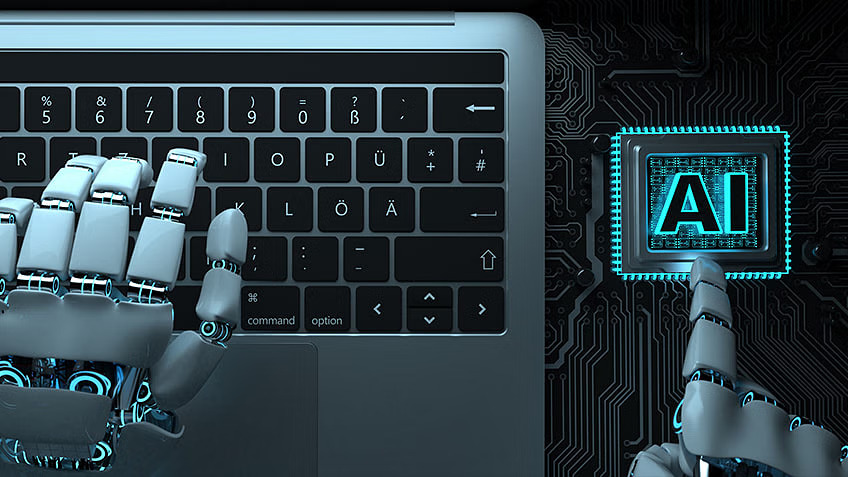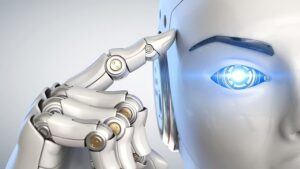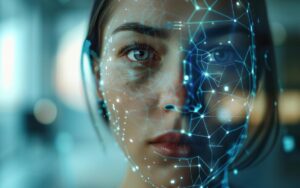Suppose we depended on science fiction stories, movies, and television shows to shape our perceptions of artificial intelligence. In that case, we’d believe that AI is limited to space exploration, killer cyborgs, talking computers, and self-aware machines that replace human workers and eliminate human jobs. But artificial intelligence applications are considerably more mundane, and the business world is one of the biggest beneficiaries of this fantastic new technology.
This article focuses on examples of practical business applications of AI over the past few years. We’ll define AI, explore how AI technology improves business processes and show you how to get started on a career in AI through online training.
Since both fields are closely related, we will also dedicate a few words to machine learning applications.
Artificial Intelligence Defined
We should define the term to understand the applications of artificial intelligence better. Artificial Intelligence (AI) is machine-displayed intelligence that simulates human intelligence or behavior and can be trained to solve specific problems. Artificial intelligence is a fusion of deep learning and machine learning techniques. Different artificial intelligence models are prepared with giant volumes of data and can make intelligent decisions.
So, artificial intelligence uses robust databases and computer science to create machines that simulate the human brain’s intelligence processes.
Also Read: Are Machine Learning and Data Science the Same?
The Three Main Engineering Applications of Artificial Intelligence in Business
Process Automation
Also called robotic process automation or RPA, this automates various digital and physical tasks, usually involving back-office administrative and financial activities. It is especially ideal for working across many back-end systems. RPA is more sophisticated than earlier attempts at business-process automation tools because the server code (e.g., the “robots”) acts like how a human would interact with information from multiple IT systems. Typical RPA tasks include:
- Replacing lost ATM or credit cards, accessing multiple systems to handle customer communications, and updating records
- Transferring information from call center systems and e-mail into systems of record (e.g., updating customer files with address changes or service changes)
- “Reading” legal documents and contracts to extract provisions using natural language processing
- Reconciling failures to bill for services across billing systems by pulling information from multiple document sources
Robotic process automation is the least expensive and easiest to implement of the current business AI technologies and usually creates a timely and generous return on investment (ROI). Unfortunately, it’s also the least “smart” AI since it’s typically not programmed to learn and improve, although that is gradually changing.
RPA typically doesn’t result in job losses, but the likelihood increases as the technology improves. Even so, most RPA functions exist not to eliminate job positions but to make work easier. Most positions lost were jobs that were being outsourced anyway; a good rule of thumb is that if a job can be outsourced, it can be done by robotic process automation.
Cognitive Insight
The second AI type uses algorithms to locate patterns in large volumes of data and interpret their meaning. Cognitive insight applications are typically used to:
- Predict what certain customers are likely to buy
- Identify credit fraud cases in real-time, detect insurance claims fraud, and provide other forms of fraud detection
- Analyze warranty data, looking for patterns that help identify safety or quality issues in automobiles or other manufactured products
- Automate personalized target marketing of digital ads
- Offer insurers more accurate and detailed actuarial models
There are three ways that cognitive insights yielded by machine learning differ from traditional analytics: Cognitive insights are usually much more detailed and data-intensive, the models used in cognitive insights are typically trained on some portion of the data set, and the models’ performances improve—they can gradually categorize and predict better.
Cognitive insight applications usually improve performances on jobs that only machines handle, like programmatic ad buying that involves high-speed data crunching and automation that far exceeds human intervention or capabilities. Hence, this technology is generally not a threat to human jobs.
Cognitive Engagement
Cognitive engagement interacts with customers and employees using machine learning, intelligent agents, and natural language processing chatbots. These artificial intelligence applications include:
- Intelligent agents that provide 24/7 customer service addressing a wide range of issues from tech support questions to password requests, all rendered in the customer’s natural language.
- In-house sites that answer employee questions concerning employee benefits, HR policies, and IT.
- Product and service recommendation systems for businesses that can boost personalization, engagement, and sales, usually involving rich language or images.
- Health treatment recommendation systems help medical providers devise customized patient care plans that consider the individual patient’s health status, past medical history, and previous visits and treatments.
Cognitive engagement technologies usually interact more often with in-house personnel than with external customers. As technology improves, however, this could change. Cognitive engagement technology is currently not threatening sales representatives or customer service jobs. Companies employing cognitive engagement aren’t trying to reduce staff but rather to take on increasing employee and customer interactions while keeping current staff levels. For example, some organizations aim to hand over routine communications to AI systems while transitioning their customer-support staff to more involved, complex activities such as handling escalated customer issues, touching base with customers before they call in with problems, or conducting extended unstructured conversations.
Let’s take a closer look at specific applications of AI in today’s commercial sector before getting into how online AI and ML training can help you get into this exciting and growing field.
Also Read: Machinе Lеarning Algorithms: A Beginner’s Guidе
How Are Businesses Specifically Using Artificial Intelligence?
This list is just a sampling of the various applications of AI in business. You will notice a lot of overlap in many of these applications. This overlap speaks to the wide-ranging versatility and power of artificial intelligence.
Personalized Shopping
Artificial Intelligence technology can create recommendation engines to improve customer engagement. These recommendations are based on the users’ browsing histories, interests, and preferences. As a result, personalized shopping helps improve brand loyalty and customer relations.
AI-Powered Assistants
Virtual shopping assistants and chatbots enhance the user’s online shopping experience. These assistants use Natural Language Processing to make the conversation sound as personal and human as possible. Additionally, AI-powered assistants can engage with customers in real time.
Fraud Prevention
Credit card fraud and false reviews are two of the biggest e-commerce problems businesses face today. Unfortunately, these issues undermine consumer trust and confidence. But by considering usage patterns, AI can help reduce the possibility of credit card fraud. Additionally, AI can help identify and remove fake reviews.
Spam Filters
Spam is everywhere, but many e-mail utilities feature AI-based spam filters that send offenders to spam or trash folders and keep employees’ e-mail inboxes uncluttered and safe.
Facial Recognition
Devices like smartphones, laptops, and PCs use facial recognition techniques to detect and identify authorized users, thus providing secure access and keeping company assets safe. Many industries have high-security areas, and facial recognition makes authorization faster and more accurate.
Recommendation Systems
Businesses use recommendation systems to collect user data and provide customized recommendations, increasing user engagement. As a result, recommendation systems are a widely used Artificial Intelligence application across many industries. Recommendation systems help businesses focus their efforts better and increase the chances of a sale. This focus helps eliminate wasted marketing efforts.
Human Resources
While artificial intelligence may not help you stop Joe from stealing your lunch from the break room (yet), it does help with activities like blind hiring. Recruiters can use machine learning software to examine applications based on set parameters. This application helps save the recruiter’s time, as this AI-enhanced software can reduce the pile of resumes based on specific keywords and other data.
Marketing
Thanks to artificial intelligence, marketers can deliver highly targeted and personalized ads. AI also helps optimally retarget existing marketing campaigns to audiences, ensuring better results and increasing customer satisfaction.
AI helps with content marketing so that it conforms to the brand’s style and voice. Additionally, AI can handle routine tasks like measuring performance, campaign reporting, and more.
And that’s just the beginning. Chatbots powered by AI technology, like natural language processing, natural language understanding, or natural language generation, can analyze the customer’s language and respond accordingly, mimicking human speech, mannerisms, and idioms.
And finally, this application of AI can give users real-time personalization based on their behavior and tailor marketing campaigns to fit the specific needs of a local market.
Chatbots
AI chatbots can understand natural language and respond to online customers using the “live chat” feature many businesses offer for customer service. AI chatbots can be integrated into many websites and applications, eventually building a database of answers. This answer database, obtained through increased interaction with customers, supplements any previously established selections of integrated solutions set up by the company. As AI technology improves, chatbots can effectively respond to simple inquiries, resolve customer issues, and improve customer service while providing 24/7 support. AI chatbots ultimately improve customer satisfaction without the business allocating excessive funds to hire more people to meet these goals. So, chatbots wouldn’t typically replace human employees but rather allow the company to expand its customer service operations in areas like availability, accessibility, and effectiveness..
AI has many other uses, and its versatility makes it a standard tool across many social sectors. However, every day brings new AI ML applications to the business world, and artificial intelligence’s true potential has yet to be realized.
Also Read: AI in Marketing: Here’s What You Need to Know
A Word About Machine Learning
No article on the applications of AI is complete without mentioning machine learning applications. After all, there’s a significant overlap between artificial intelligence and machine learning, and we’ve already referenced the latter in this article.
Here are some typical machine learning applications in business today:
- Recommendation engines
- Search engine results
- Fraud detection
- Spam filters
- Chatbots
- Real estate valuation
- Customer retention
- Sentiment analysis (opinion mining)
Remember, the primary difference between artificial intelligence and machine learning is that artificial intelligence is an umbrella term that describes computer software that imitates human cognitions to perform complex tasks and learn in the process. On the other hand, machine learning is a subfield of AI that employs algorithms trained on data to create adaptable models that can accomplish many complex tasks.
Artificial intelligence says, “Machines can mimic human intelligence by creating the appropriate programs.” But machine learning says, “Just give the machines the data, and let them learn from doing the tasks and finding patterns.”
Do You Want to Learn More About Artificial Intelligence?
Artificial intelligence is a demanding field, so the more skills you possess, the better equipped you will be to accept the challenges of this innovative technology. This AI ML bootcamp provides a high-engagement learning experience teaching concepts and skills like computer vision, deep learning, ensemble learning, speech recognition, neural networks, and much more. Additionally, the applied learning method in this bootcamp gives you the opportunity to engage in real-world projects allowing you to actually participate in building the applications of AI.
Ziprecruiter.com reports that an artificial intelligence engineer in the United States earns an annual average of $156,648, ranging as low as $79,500 and as high as $266,500.
If your imagination and career aspirations are fired up by the idea of artificial intelligence and machine learning, check out this bootcamp and get the training you need to face the challenges of ever-evolving high technology.
You might also like to read:
What is Artificial Intelligence? A Comprehensive Guide for Beginners
All About Artificial Intelligence Skills
Are the Sciences of Artificial Intelligence and Machine Learning the Same Thing?






